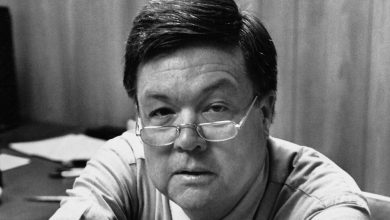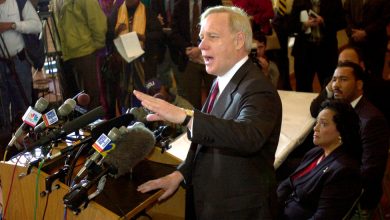DiFi, Breaking Into the Boys’ Club

WASHINGTON — I’ve always said that the Washington Monument is an apt symbol, a Freudian obelisk redolent of all the male egos that have shaped our capital.
To appreciate what Dianne Feinstein accomplished, you need to know how male this city was in 1992, when she was swept into Congress in the “Year of the Woman” as the 18th female senator in history.
That wave was buoyed by women’s anger at the vicious Republicans and inept Democrats on the white male Judiciary Committee overseeing the Clarence Thomas-Anita Hill hearings. A sexual harasser lied his way onto the Supreme Court, and now he is doing his best to corrupt it.
These women arrived on the Hill, home to historic man caves, as the journalist Jackie Calmes called the hideaways where male pols horse-traded, sipped whisky and played poker. When one new lawmaker stepped into the House elevator, the female operator said icily, “This elevator is for members only.”
“Yes, thank you,” the representative replied, waiting for the operator to spot her blue pin with the congressional seal.
A small sorority worked to penetrate the good ol’ boys club (and not be mistaken for staff). “With so many new women and minorities, everyone’s constrained to be politically correct,” Charles Wilson, the colorful Texas representative, told me that year. He deadpanned that he tried to irritate his colleague Patricia Schroeder of Colorado “by calling her Babycakes, but that’s about it.”
Despite stereotypes — “The word was women could not get along,” the former California senator Barbara Boxer recalled Friday to Katy Tur of NBC — women worked together to buck rules about how they couldn’t wear pants on the Senate floor and lobbied for a women’s restroom off the House floor so they wouldn’t have to trek to the women’s reading room. (That wouldn’t happen until 2011.)
Representative Louise Slaughter of New York told Hillary Clinton, the new first lady, of trying to include women’s health issues in the budget, noting: “It’s almost certainly the first time that these guys on the budget committee heard words like ‘cervix,’ ‘ovaries’ and ‘breasts’ spoken out loud.”
Hillary drolly riposted, “At least in that context.”
Nancy Pelosi told us at a lunch for women journalists last December that she never made it into a Democratic speaker’s office until she became the Democratic speaker.
Several years ago, Senator Feinstein invited me to her house one evening for a drink. I was very excited. I’d watched male columnists play golf with presidents and go drinking with male lawmakers for a long time, and now at last I was going to be ushered into an inner sanctum.
The very proper senator sat with a small dog on her lap in her elegant living room as we had a glass of wine. She didn’t want to spin me on anything or break news. She just wanted to chat. It turned out that DiFi, as she was known, regularly organized dinners with female journalists and mentored women in Congress; she often said that Washington could be a lonely, hard and mean place, especially for women breaking barriers.
Unlike Hillary, who got tangled in the gender issue, Feinstein (like Pelosi) played the game without regard for gender. She wasn’t worried about sexist criticism; she was focused on doing what she thought was right, no matter who complained.
In 2019, DiFi went viral when a group of child activists confronted her in her San Francisco office for not supporting the Green New Deal. She engaged with them but then briskly rebuffed them, saying she wasn’t succumbing to any “my way or the highway” demands.
As chair of the Senate Intelligence Committee, she led the fight in 2014 to release the classified report on U.S. torture in Iraq, Afghanistan and Guantánamo. It took guts to go up against President Barack Obama and his C.I.A. chief John Brennan, who wanted to keep covering up what The Times would call “a portrait of depravity.”
George W. Bush’s C.I.A. director Michael Hayden said dismissively that Feinstein couldn’t be objective because she was motivated by “deep emotional feeling.”
“Nonsense,” she snapped back. The senator simply wanted America to face the ugly truth so we would never betray our values in such a grotesque way again.
She believed in government as a force for good. Unfortunately, she died at 90 watching our government coming off the rails.
Despite being surrounded by Republican lawmakers who never met a gun they didn’t like, Feinstein did her best to stop people from getting killed in mass shootings, driven by her traumatic experience with the assassination of Mayor George Moscone of San Francisco and Harvey Milk, the first openly gay elected official in California and her colleague on the Board of Supervisors.
Back in 2008 when the Sean Penn movie “Milk” came out, a solemn Feinstein told me: “I was the one who found his body. To get a pulse, I put my finger in a bullet hole.”
When she opposed the 2008 proposal to ban gay marriage in California, she told me of the evolution of her thinking: “The longer I’ve lived, the more I’ve seen the happiness of people, the stability that these commitments bring to a life. Many adopted children who would have ended up in foster care now have good solid homes and are brought up learning the difference between right and wrong.”
Yep. A class act, all the way.
The Times is committed to publishing a diversity of letters to the editor. We’d like to hear what you think about this or any of our articles. Here are some tips. And here’s our email: [email protected].
Follow The New York Times Opinion section on Facebook, Twitter (@NYTopinion) and Instagram.



